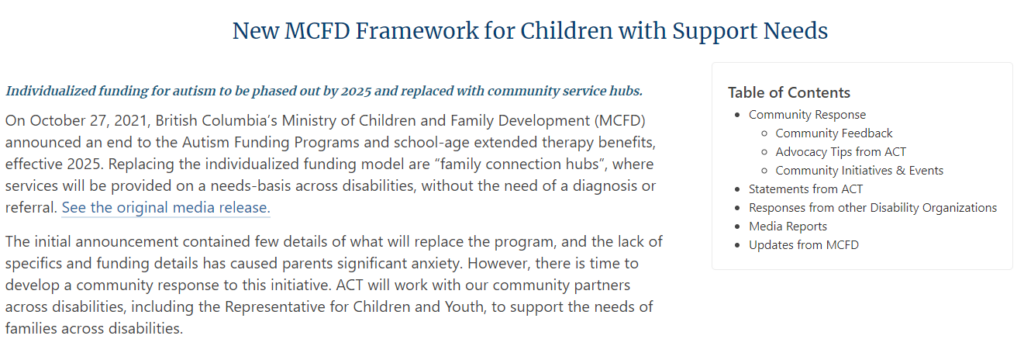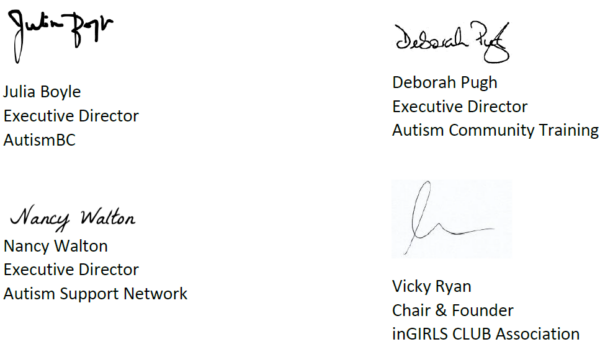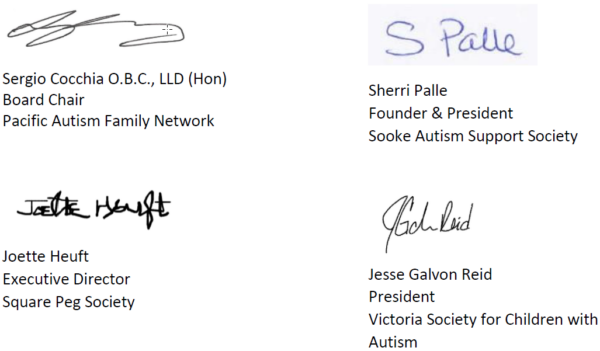ACT’s “New MCFD Framework for Children with Support Needs” Resource Page
There is information coming from many different sources about the new Ministry of Children and Family Development (MCFD) framework for children with support needs.
ACT – Autism Community Training is organizing this information on a special page of our website. Visit the “New MCFD Framework for Children with Support Needs” page to see the latest information.

If you are new to ACT, join our confidential email list for updates and more information as it becomes available: www.actcommunity.ca/mailing-list
Follow us on Facebook: www.facebook.com/autismcommunitytraining
Questions for ACT? Email us at [email protected].
Letter to Minister Dean Regarding CYSN Framework & Funding Changes
“All children with disabilities deserve support tailored to their unique needs and strengths without pitting their families against each other to secure those supports.”
Eight organizations from around the province have united in a letter to MCFD Minister Mitzi Dean. The letter is a searing critique of the lack of community consultation and basic information about the radical new framework for CYSN services announced last week by the Minister. The letter also seeks collaboration from other organizations across disabilities to press for systemic change. If your organization wishes to add your name to the signatories, please email [email protected].”
Monday, November 8th, 2021
To: Honourable Mitzi Dean, Minister of Children and Family Development Victoria, BC
Subject: CYSN Framework and Funding Changes Dear Honourable Mitzi Dean,
A growing group of organizations representing all children and families under the Children and Youth with Support Needs (CYSN) Framework have come together to discuss their concerns regarding your announcement on October 27th, 2021. Today, we write together on two topics of immediate concern: consultation and information.
First, we call for a review of your decision-making process by revisiting the practices and principles of meaningful consultation.
Second, we request changes to your communication strategy to prevent further harm to the disability community and promote supportive systemic change.
We are deeply concerned about the absence of meaningful and informed consultation with the diverse range of families and children under the CYSN Framework and the organizations that support them. While you repeatedly cite the 1,500 families consulted in 2019 and insist that you continue to hear from families, we consider this past consultation grossly inadequate and inaccurate.
We invite the Minister to define the parameters of future consultation together with the disability community to demonstrate her accountability to the families and stakeholders she serves. There is ample research and dozens of frameworks that outline healthy and meaningful processes of public consultation. Therefore, it is difficult to understand how the Minister believes British Columbians would be satisfied with the minimal and questionable consultation process undertaken. There was no consultation on the decision to remove or reallocate the individualized funding for the Autism Funding Programs or the At-Home Program ahead of the announcement of this decision last week.
Additionally, the way information was released last week has caused confusion and chaos in the disability sector. Your communication strategy does not reflect best practices in change management, nor does it demonstrate your understanding, concern, or care for the people affected by the proposed CYSN Framework. The Left Out report has confirmed that the disability community is struggling 20 months into the Covid-19 pandemic. Sadly, instead of lifting the spirits of families of neurodivergent children, this announcement has added more stress, fear, and emotional weight to the entire community. The heartbreaking testimonials of these families can be found in every corner of the province and on every platform of self- expression.
We respectfully ask you to answer the questions raised by parents across BC and provide detailed information on the strategies, tactics, and funding your Ministry will use to implement the hub-based model. Explaining how this model will operate in the immediate future and into 2025 is a crucial step towards the Ministry building trust, confidence, and calm among members of the disability community. This trust is critical for the Ministry to build with Indigenous children and families if it is serious about reconciliation.
Your announcement and communications appear to be an attempt to cause an unnecessary divide between the autism community and the broader disability community. Your comments have jeopardized relationships and trust by politicizing and prioritizing the needs of specific community members over others. The strategy of removing services from one marginalized group in the name of equality to better serve another marginalized, underfunded group is theoretically, economically, logistically, and ethically flawed. All children with disabilities deserve support tailored to their unique needs and strengths without pitting their families against each other to secure those supports.
The signed are eager to prevent further harm by promoting safe spaces for discussion. We invite any organization representing families under the CYSN Framework to reach out to the hitherto signed organizations to further dialogue about how best to meet the needs of families, children, and youth with support needs in this province.
We call on the Minister to engage in a truly meaningful consultation process and develop a strategy to address the informational needs and concerns of all families affected by these sweeping changes to the CYSN Framework. We demand a transparent and open consultation strategy that will allow room to adjust the model to truly meet the needs of all children and families across the province.
Sincerely,
Cc: Hon. John Horgan, Premier and President of the Executive Council, and MLA for Juan de Fuca: [email protected] & [email protected]
Ms. Allison Bond, Deputy Minister, MCFD: [email protected]
Ms. Shirley Bond, MLA for Prince George-Valemount, BC Liberal Party Interim Leader and Official Opposition critic for Seniors Services and Long Term Care, and Health: [email protected]
Ms. Karin Kirkpatrick, MLA for West Vancouver-Capilano and Official Opposition critic for Children, Family Development, and Childcare: [email protected]
Mr. Trevor Halford, MLA for Surrey-White Rock and Official Opposition critic for Mental Health and Additions: [email protected]
Ms. Sonia Furstenau, MLA for Cowichan Valley, Leader of the BC Green Party and House Leader: [email protected]
Ms. Stephanie Cadieux, MLA for Surrey South and Official Opposition critic for Gender, Equity, Accessibility, and Inclusion: [email protected]
Ms. Jackie Tegart, MLA Fraser-Nicola Opposition critic for Education: [email protected]
Mr. Dan Davies, MLA Peace River North and critic for Social Development & Poverty Reduction: [email protected]
Ms. Teresa Wat, MLA for Richmond Centre and a former member of the Select Standing Committee on Children and Youth: [email protected]
Response from 500 families to MCFD’s plan to phase out Autism Funding

In the last six days, ACT has received over 500 responses from parents to the announcement by BC’s Ministry of Children and Family Development [MCFD] that Autism Funding will be phased out in 2025.
95% of the responses are critical. To allow parents to speak for themselves, we provide over 150 representative excerpts on a special page of ACT’s website. Most responses express common themes of frustration, fear, anxiety and anger that such a dramatic change is being contemplated without considering the implications for the thousands of families who have used autism funding to build effective, individualized supports for their complex children. We will be sharing these with all of BC’s MLA’s later this week.
Lack of Meaningful Consultation
Many parents query why families of children of autism were not consulted before deciding on such a radical departure. Minister Mitzi Dean’s response has been that they were consulted. It is true that MCFD has held broad consultations starting in 2019 about the many deficits in the services that are meant to serve children with neuro-developmental and physical disabilities. However, MCFD’s solution: ending the Autism Funding Programs and centralizing all services in “hubs” was never proposed at a community level before this announcement. Hence the outrage of families.
ACT’s Executive Director, Deborah Pugh participated in the Minister’s Advisory Council for the period after its establishment in the summer of 2021 but stepped down in July because of the superficial nature of what was being presented by MCFD. In ACT’s view, there was a lack of meaningful engagement with Council members, who were a group of well-informed community representatives with links across disabilities.
Next Steps
In the days and weeks to come, ACT will continue to work with the Representative for Children and Youth, autism organizations, and other disability organizations to listen to their perspectives.
Our focus will be on contributing to a united front of families who believe that all children in BC with neurodevelopmental concerns and/or physical disabilities have a right to early diagnosis and evidence-based resources, including access to individualized funding when it best meets the needs of their child and family.
Community Initiatives
There are a number of initiatives being organized currently. To see the latest, check ACT’s Facebook page.
Parent petition reaches 7,250 in five days
A petition to Premier John Horgan, MCFD Minister Mitzi Dean and others has reached 7,250 signatures and is continuing to grow, fueled by parent outrage at the lack of community consultation prior to the framework announcement last week. See the petition here
Confusion Over Need for Diagnosis Follows MCFD’s Announcement on Autism Funding
Diagnosticians around BC have reported that parents are calling to cancel their child’s diagnostic appointments. Yesterday, the Ministry of Children and Family Development announced that they are moving to a “needs-based” system. In response to this announcement, some families have now concluded that there is no purpose in having their children diagnosed.
Do not cancel your diagnostic appointment!
ACT is also requesting diagnostic clinics to share this page with families asking them to take a week to reconsider before cancelling their appointments.
The Importance of Seeking a Diagnosis
Here are a few points to help clarify the importance of seeking a diagnosis and the possible limitations of a needs-based system:
- A diagnosis done by a team of multi-disciplinary specialists provides essential in-depth information to early intervention teams, to schools and to families.
- A diagnosis of autism, ADHD, FASD, a communications disorder or many other ‘invisible’ conditions helps the child better understand their own needs and the family to provide more sensitive support in the home.
- A diagnosis may allow the family to apply for the Disability Tax Credit – funded by the federal government and may affect access to school-based, and later adult, services.
- It will be at least three years before a new system comes into place across BC – and it may look very different from what MCFD is describing. In the meantime, newly diagnosed children with autism will receive funding. It would be premature to cancel diagnostic appointments.
Follow the Money!
- MCFD has not provided a budget which usually accompanies a program announcement. Minister Mitzi Dean did not provide assurances that there would be more funding when she answered questions from the media yesterday about the budget for this initiative.
- Currently most MCFD-funded services do not require a prior diagnosis – essentially they are needs-based. Child Development Centres, Supported Child Development Program, Infant Development Program, Children and Youth Mental Health all have long waiting lists. Children often age out before they receive service.
- For many years, MCFD has refused to increase funding to meet the demand from children and their families, not affected by autism, despite the desperate pleas of families. If MCFD is prioritizing their urgent needs, they could take immediate action and properly fund current services as they transform their system.
- Many observers, including ACT, are concerned that the funding now allocated to 20,000 children with autism will now have to meet the needs of at least 30,000 children – and likely many more. There are also no specifics of how they will manage the capital costs of building multiple hubs across the province. Seeing budget commitments will be crucial to determining whether this initiative is simply a way of shutting down individualized funding or is truly about creating a robust system of support for children with disabilities.
Who Determines Need?
- A key issue is that someone will have to determine the relative needs of the children who are likely to overwhelm this new system for years to come. MCFD has not published the screening tools that are to be used by the new hubs, in order to assess relative need. Many families who have children with invisible disabilities have been told that their children either do not have needs or that the needs of others are higher.
- For the past two decades, families of children with autism have not had this barrier to accessing service because a diagnosis of autism has meant almost immediate access to individualized funding. Without specific funding and service commitments, it is difficult to see how this new system will provide support to 30,000 children.
ACT strongly believes that all children with support needs in BC require services that meet their individual needs – it is untenable that only children with autism should have access. However, we also remain concerned that based on MCFD’s record, there is little evidence that MCFD is prepared to implement systematic change that will ensure quality services based on evidence-informed practice – despite years of promising a new framework. The failure to collaborate with diagnostic services before announcing such a sweeping systemic change is an early indication of the need for MCFD to seek the input of experienced clinicians and researchers.
What is your response to MCFD’s Announcement cancelling Autism Funding in 2025?
If you are the caregiver of a child with support needs and have questions or concerns that you would like to share with ACT, please fill in the form linked below. We will be compiling this information and posting it on a special page on ACT’s website.
Share your input
Background:
MCFD Announcements and Resources:
- October 27 Media Release from MCFD
- October 27 Press Conference Recording
- Resource Page: New family connections hubs
- Resource Page: What to expect while change happens
- Resource Page: Information for service providers
ACT’s Appeal to Families:
What is your response to MCFD’s Announcement cancelling Autism Funding in 2025?
BC’s Ministry of Children and Family Development has just announced an end to the Autism Funding Programs and school-age extended therapy benefits, effective 2025. See media release here: https://news.gov.bc.ca/releases/2021CFD0067-002047
There are very few details of what will replace the program; the lack of specifics is likely to cause parents significant anxiety. However, there is time to develop a community response to this initiative – the first step is to see whether MCFD has a detailed plan that can be analyzed. ACT will work with our community partners across disabilities, including the Representative for Children and Youth, to prepare detailed questions for Minister Mitzi Dean.
We are especially concerned to determine if the new initiative will be grounded on evidence-based practice. We are also concerned about whether there will be guaranteed levels of service, and the funding to support adequate interventions for all children with support needs. A very important consideration is whether there will be parent choice in service providers.
If you are the caregiver of a child with support needs and have questions or concerns that you would like to share with ACT, please fill in the form linked below. We will be compiling this information and posting it on a special page on ACT’s website.
Share your input
https://forms.office.com/r/k69mifvea5
Update: MCFD has posted the recording of the press conference with Minister Mitzi Dean regarding this announcement. View the full conference here.
If you are new to ACT, join our confidential email list for updates and more information as it becomes available: www.actcommunity.ca/mailing-list
Questions for ACT? Email us at [email protected].




